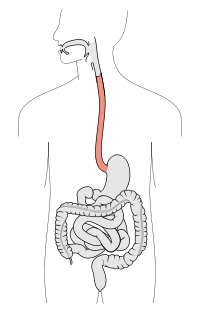
Photo from wikipedia
Laryngopharyngeal pH-monitoring (Restech) is a relatively new reflux testing device that needs more validation. It was developed to detect both liquid and acidic gas vapor, and the more consistent pharyngeal… Click to show full abstract
Laryngopharyngeal pH-monitoring (Restech) is a relatively new reflux testing device that needs more validation. It was developed to detect both liquid and acidic gas vapor, and the more consistent pharyngeal placement may lead to more reliable results, especially when laryngopharyngeal symptoms such as cough, hoarseness and globus sensation are present. Aim of this study is to determine if Restech can identify patients with a successful outcome for certain symptoms after antireflux surgery. In our esophageal center of excellence, more than 300 esophageal surgeries are performed annually. All patients are prospectively entered in our IRB approved database and undergo a routine check-up program with postoperative surveillance following surgery. All patients with suspicion for GERD received a complete diagnostic work-up for gastroesophageal reflux including symptom evaluation, endoscopy, 24-hour impedance pH-metry, high resolution manometry and Restech. Only patients with a complete dataset and oropharyngeal reflux symptoms were included in this study. A total of 155 [99 females] consecutive patients with suspected gastroesophageal reflux disease and oropharyngeal symptoms that were seen between 10/2013 and 08/2018 were included and underwent 24-h laryngopharyngeal with concomitant esophageal pH-monitoring. A total of 24 of these patients with laryngopharyngeal symptoms underwent laparoscopic antireflux surgery from 10/2013 - 02/2018 and had a complete follow up. Restech evaluation was abnormal in 62.5% (n=15, mean RYAN Score upright 121.73 [35.1-386.05], mean RYAN Score supine 5.74 [2.17-50.62]). Two out of preoperatively 12 [16.7%] patients with a pathologic Restech test complained about regurgitation after surgery versus 4 out of preoperatively 8 [50%] patients with a normal Restech result. No patient with an abnormal Restech result out of preoperatively 11 complained about extraesophageal symptoms after the surgery versus 1 from preoperatively 4 [25%] patients with a negative Restech. An abnormal Restech result better identifies a successful outcome for regurgitation and extraesophageal symptoms after antireflux surgery. All patients had a complete resolution of extraesophageal symptoms after surgery.
Journal Title: Diseases of the Esophagus
Year Published: 2019
Link to full text (if available)
Share on Social Media: Sign Up to like & get
recommendations!